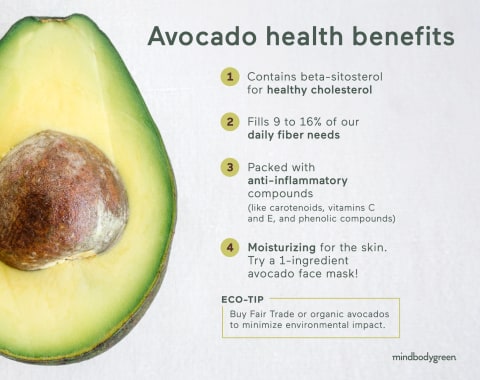So, what exactly are the benefits of avocados? Here’s a look at what the fruit (yep, it’s a fruit!) can do for your gut, skin, and overall health. Beta-sitosterol is a phytosterol that is similar in structure to cholesterol and leads to lower levels of cholesterol in the body via the hepatobiliary system (through excretion). Avocados contain wonderfully healthy fats: monounsaturated fatty acids (MUFAs) and polyunsaturated fatty acids (PUFAs). Both MUFAs and PUFAs work to lower LDL levels (bad cholesterol)2 in the blood. Wilson adds that with a healthy gut and adequate fiber comes regular bowel movements—an essential part of the body’s detoxification system. The skin is a metabolically active organ, meaning it can use fatty acids like oleic acid3 in order to lock in moisture. Oleic acid plays a role here, too, says Munnelly. Previous research has found that diets high in oleic acid have a positive impact against inflammatory-related diseases4 and activate the pathways of certain immune-boosting cells. Avocados are also a great source of alpha-linolenic acid (ALA), an essential omega-3 fatty acid. ALA has been shown in preclinical research to lessen inflammatory pathways in gastrointestinal disease models like colitis5, and has neuroprotective effects6. A study published in the Journal of the American Heart Association helps bust the belly fat myth. The subjects were split into two groups: One group ate a large avocado every day for six months, while the other made no changes to their diet. After six months, the researchers found no differences in belly fat between the two groups. However, the group that ate a daily avocado did experience a decrease in total and LDL cholesterol. “This proves an important point: There are no silver bullets in nutrition,” says Munnelly. “Eating avocados but doing 10 other things in your daily life that contribute to high cholesterol and extra belly fat might not get you the results you’re looking for.” The carotenoids in avocados are especially important because they have a built-in absorption benefit—intrinsic fats in the fruit help enhance the bioavailability and absorption of these fat-soluble carotenoids. As a general rule of thumb, Munnelly recommends sticking to one-half an avocado as the standard serving size with your meal or as a snack. Avocados are particularly beneficial if you follow a ketogenic diet or Mediterranean diet pattern due to their nutrient composition of healthy fats. Not to mention, according to a water footprint calculator, it takes 60 gallons of water to grow just one avo. To help reduce the environmental impact of the fruit, Wilson also recommends buying avocados that are labeled Fair Trade and/or organic. When you’re done enjoying your avo, the leftover pits can even be used to dye your clothes a wonderful shade of pink! A hard, green avocado typically needs four to seven days to ripen. However, there are a few tricks you can use to speed up this process. For instance, Munnelly recommends wrapping your avocados in tin foil and placing them in the oven at 200 degrees Fahrenheit for 10 minutes. Or, if you have a few days, Munnelly and Wilson say to stick the avocado in a brown paper bag with an apple or banana. These fruits produce ethylene gas12, which speeds up the ripening process. “To store cut avocado and prevent it from getting brown and mushy, squeeze some fresh lemon juice on it and place it in an airtight container,” says Munnelly. “Cold water will also work if you don’t have lemon juice on hand. It helps if you don’t remove the pit before storage.” Here are more hacks to keep your avocados fresh.





